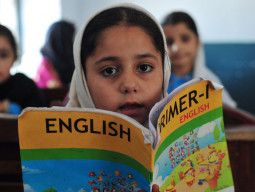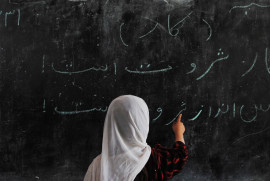
Pakistan’s daily disasters and constant crises mean that long-term issues, education prominent among them, get little attention from our harried leadership. When education is addressed, the focus is almost entirely on increasing access, enrolment and literacy, and if we’re lucky, on girls’ schooling. Getting children to go to school, and to stay there, is obviously critical. Fortunately, we appear to be on a positive trajectory in terms of this goal, especially in Punjab.
But that goal overlooks the glaring education emergency within our schools. The fact is that our schools are failing miserably in educating the children who make it to them. Each day is an opportunity lost for each uniform-clad, schoolbag-burdened child who heads to school in the morning. These children attend school, but are not getting an education. Their inquisitive spirit is crushed, their thinking ability never developed. They are never taught that there are, at least, two sides to every story, and every history. They never learn to question and to analyse, much less to imagine and to create.
Let me be clear here — I am not talking about the schools which cater to our elite, but about those that reach our masses. In these schools, textbooks following the official curriculum, with their poor quality, and questionable and biased content, reign supreme. The teachers literally teach one page of the textbook per lecture, asking students to memorise the content, with barely any explanation and no additional material taught.
In a typical high school classroom scene, the teacher asks a favourite student to read aloud a paragraph from the course textbook. As the student reads, the other students sway slightly back forth as if in a trance — they are rote learning the content. In one class 10 lecture I attended, a teacher had the students memorise, down to decimal places, the exact amount in dollars that Pakistan spent on each of its imports. The dollar figure was from two years ago. The futility of this exercise was mind-numbing.
These teachers are not villains. They are part of a system in which board examinations are the ultimate assessment and the exams reward memorisation of the course textbooks. This situation persists despite the 2006 curriculum reform that was supposed to tackle textbooks, as well as teaching, both by correcting mistakes and biases in textbooks, and improving teaching and examination methods.
But the reform has resulted in marginal changes, at best. Implementation of these small changes has also been exceedingly slow. It has been impeded by a new policy, which made textbook writing a competition among private publishers, and the Eighteenth Amendment, which made curricula a provincial subject, thereby granting power to new provincial curriculum authorities and creating a turf battle with the old textbook boards. These parallel, confused structures have implemented the reform in slow, iterative stages in Punjab and are still at the early stages in Sindh.
On the other hand, India is far ahead of Pakistan in curriculum reform. The Indian government undertook an overhaul of their textbooks in the mid-2000s and chose a university professor, Krishna Kumar, to lead the effort. Their new textbooks for high schools “demonstrate how historians work, how they use sources and evidence, and why interpretations of the same event differ”, and notably use this approach in discussing Partition, a sensitive and charged issue for both countries.
The contrast between the speed, and the breadth and depth of India’s and Pakistan’s reforms is startling. It points to the benefits of having a government outsider, an academic, being charged with the reform rather than a large bureaucracy. But Pakistan also crucially suffers from a lack of political will from the centre for deep policy changes with regard to our biased curricula and ineffective teaching methods.
So each day, a silent tragedy continues to occur in classrooms across the country. We create a new generation of non-thinkers, who cannot think logically, cannot evaluate evidence and cannot discern trustworthy sources of information from those which are not. The source of our lack of a national imagination becomes clear. We also begin to understand why we blindly trust some things, but sceptically disregard others. And why we cannot seem to think our way out of the mess in which we find ourselves.
Published in The Express Tribune, October 24th, 2013.
Like Opinion & Editorial on Facebook, follow @ETOpEd on Twitter to receive all updates on all our daily pieces.
COMMENTS (16)
Comments are moderated and generally will be posted if they are on-topic and not abusive.
For more information, please see our Comments FAQ

































































Textbooks do need to be upgraded but a lot of problems will be solved, if only the pattern of examination is changed by our exam boards.Rather than testing a students rote memorization skills, the pattern should focus on testing the ability of a student to critically analyze and assess a situation and then apply what he has learned.This should be for the case for humanities as well as science subjects,where the same questions are repeated year after year,with the same answers.
Having done Fsc. a couple of years ago,I can still recall answers to several math problems in exact figures.Because I knew I would be tested with the same questions. And so I deluded myself,thinking I was really learning something,when in fact it was nothing more than cramming.
Thankfully, somehow I taught myself to think critically and apply what I learnt which saved me a lot of trouble during my university years.However, I do not believe everyone coming out of this educational background would be able to do that because its a lot of work in changing your learning skill set.Its much better if critical thinking skills should be inculcated in students during school years.
This article is most relevent., I wish more people would read it, this is an eye opener and educational institutions should take serious note, especially decision making people. Education is the most important issue facing Pakistan. Articles concerning education should be given priority. Our country is so behind, because we cannot even think critically, evaluate objectively, ask relevent questions. We have to have a system where we can produce good teachers, who can make students think critically, think objectively and produce students who can evaluate. This is important for research for nation building. In many countries of the world, education is given top priority, people who wish to enter the job market, wish to become teachers, because they are the best paid. Our basic values have to change. Yes all developed countries are developed because of education.
@Pakistani:::The way you answered Ayesha you have inadvertently proved her point
@water bottle: What was it about her comment that made you sensitive? I don't remember it explicitly saying DON'T look to India.What a childish remark. Finland and Japan (along with several other countries) are on a standard that very few countries are so it's only natural to mention them. I'd imagine she's mention US long before she'd mention India or any other Southeast Asian country and as we all know, the US is lagging behind other developed nations currently. That's not a personal attack, simply a point. No need to take such things personally mate. Cheers.
education should go to every nook and corner of the country.... dats what we r trying to do here in india........basic infra...teachers,books ,schemes like laptops to poor rural children are something that really help.... anyway india has a lot of ground to coer when it comes to rural education and education of marginalised groups.... schedule tribes,schedule casts and muslims...
@moderators: Where is my comment?
But just look >>>>if each and every student is taught to think critically and creatively, will they not want radical changes in a consrvative society ? Do you think that all this " poor quality education" is being given purposely. ?
Do any of thier parents read books, buy books or go to a public library to borrow books ?
Quality education starts with better educated parents.
Next, stop taking people for a teaching-job, who are so useless and have such a poor IQ , that they are unemployable , to start with.
@Ayesha: It was really very painful knowing that being a Pakistani yourself - you are talking ill about your country men.. "...while a Pakistani will mouth memorized junk.."
Anything that will take power away from the maulanas, politicians and assorted people who benefit from ignorant slaves will not be welcome
I studied in Germany and I can say that German high school students are easily better than than our best university students. There is complete lack in critical thinking abilities. I guarantee an average German high schooler could give an objective analysis of Germany's painful history while a Pakistani will mouth memorized junk. Even in simple arithmetic a German will be able to do a novel problem while a Pakistani will be lost because it not in a standard format.
Look at the work Teach For Pakistan is doing www.iteachforpakistan.org
@Sajida: Why bring up other countries issues with education when the crisis is INSIDE Pakistan?? Going around saying "So and So is worse" doesn't fix anything!
Teacher training is the key to producing critical thinkers. How can untrained teachers produce trained students? For far too long successive policymakers have squandered scarce resources by focusing on adding more and more untrained teachers to the system.
And since its always difficult to teach, as they say, new tricks to old dogs, the problem stands compounded. Today there are a staggering 320,000 teachers in Punjab alone who have little or no training. It is they alone who can implement a conversion program which will rescue the students from the habits of the mind that grew out of the industrial revolution into the information age of the 21st century. This cannot happen unless the teachers are helped to build their own capacity so they can leapfrog as there is much catching up to do through vigorous teacher training and professional development programs. There is no magic in the success stories of the Finns, Japanese, Canadians, Malaysians, Indians, Sri Lankans, and Cubans to name just a few, each one of them and others like them adopted at one point in time or another a stringent teacher certification program.
Pakistan needs to value education. It should look to Finland and Japan (which topped OECD adults study).
Something to think about for you: There is an emergency in US schools as well. Poor students, now majority in public schools getting "third world" education. Meanwhile have you checked out OECD report about adults? meanwhile in UK, students are less competent than their grandparents!